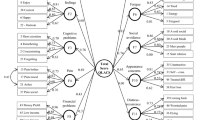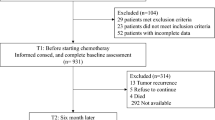Abstract
Purpose
The Mini-Mental Adjustment to Cancer Scale (Mini-MAC) is widely used to evaluate cancer patients’ psychological responses. Validation studies of the scale have shown methodological shortcomings and inconsistency in the factor solutions. The aim of this study was to examine the factor structure and psychometric properties of the Mini-MAC.
Methods
A large sample of 364 Chinese patients with breast or colorectal cancer completed the Mini-MAC and psychosocial measures (general health, perceived stress, anxiety, and depression). Exploratory factor analyses examined the relative fit of two- to six-factor models using robust weighted least square estimation and oblique target rotation. Convergent validity was evaluated via correlations between the Mini-MAC factor scores and the psychosocial outcomes.
Results
The five-factor model showed the best model fit and largely replicated the original Mini-MAC’s helpless/hopeless (HH), anxious preoccupation (AP), fighting spirit (FS), fatalism (FA), and cognitive avoidance (CA) subscales. The five factors had acceptable reliability (Cronbach’s α = 0.67–0.88) and 4-month test-retest reliability (r = 0.45–0.64). HH, AP, and CA were positively associated with the psychosocial outcomes (r = 0.19–0.60). Modest and negative correlations were found between the psychosocial outcomes and FS and FA.
Conclusions
The results support the Mini-MAC’s original five-factor structure with satisfactory reliability and convergent validity. The results demonstrate that the Mini-MAC is a valid measure for assessing psychological responses in cancer patients.
Similar content being viewed by others
References
Greer S, Moorey S, Watson M (1989) Patients’ adjustment to cancer: the Mental Adjustment to Cancer (MAC) Scale vs clinical ratings. J Psychosom Res 33(3):373–377. doi:10.1016/0022-3999(89)90027-5
Seok JH, Choi WJ, Lee YS, Park CS, Oh YJ, Kim JS, Chang HS (2013) Relationship between negative mental adjustment to cancer and distress in thyroid cancer patients. Yonsei Med J 54(3):658–664. doi:10.3349/ymj.2013.54.3.658
Johansson M, Ryden A, Finizia C (2011) Mental adjustment to cancer and its relation to anxiety, depression, HRQL and survival in patients with laryngeal cancer - A longitudinal study. Bmc Cancer 11. doi:10.1186/1471-2407-11-283
Watson M, Greer S, Young J, Inayat Q, Burgess C, Robertson B (1988) Development of a questionnaire measure of adjustment to cancer: the MAC scale. Psychol Med 18(1):203–209
Watson M, Law M, Dossantos M, Greer S, Baruch J, Bliss J (1994) The Mini-MAC—further development of the Mental Adjustment to Cancer Scale. J Psychosoc Oncol 12(3):33–46. doi:10.1300/j077v12n03_03
Ho SMY, Fung WK, Chan CLW, Watson M, Tsui YKY (2003) Psychometric properties of the Chinese version of the Mini-Mental Adjustment to Cancer (Mini-MAC) scale. Psychooncology 12(6):547–556. doi:10.1002/pon.672
Grassi L, Buda P, Cavana L, Annunziata MA, Torta R, Varetto A (2005) Styles of coping with cancer: the Italian version of the mini-mental adjustment to cancer (Mini-MAC) scale. Psychooncology 14(2):115–124. doi:10.1002/pon.826
Anagnostopoulos F, Kolokotroni P, Spanea E, Chryssochoou M (2006) The mini-mental adjustment to cancer (Mini-MAC) scale: Construct validation with a Greek sample of breast cancer patients. Psychooncology 15(1):79–89. doi:10.1002/pon.924
Kang JI, Chung HC, Kim SJ, Choi HJ, Ahn JB, Jeung HC, Namkoong K (2008) Standardization of the Korean version of Mini-Mental Adjustment to Cancer (K-Mini-MAC) scale: Factor structure, reliability and validity. Psychooncology 17(6):592–597. doi:10.1002/pon.1277
Bredal IS (2010) The Norwegian version of the Mini-Mental Adjustment to Cancer Scale: Factor structure and psychometric properties. Psychooncology 19(2):216–221. doi:10.1002/pon.1564
Costello AB, Osborne JW (2005) Best practices in exploratory factor analysis: four recommendations for getting the most from your analysis. Pract Assess Res Eval 10(7):1–9
Fabrigar LR, Wegener DT, MacCallum RC, Strahan EJ (1999) Evaluating the use of exploratory factor analysis in psychological research. Psychol Meth 4(3):272–299. doi:10.1037/1082-989x.4.3.272
Hulbert-Williams NJ, Hulbert-Williams L, Morrison V, Neal RD, Wilkinson C (2012) The Mini-Mental Adjustment to Cancer Scale: Reanalysis of its psychometric properties in a sample of 160 mixed cancer patients. Psychooncology 21(7):792–797. doi:10.1002/pon.1994
Pan PC, Goldberg D (1990) A comparison of the validity of GHQ-12 and CHQ-12 in Chinese primary care patients in Manchester. Psychol Med 20(4):931–940
Leung DYP, Lam TH, Chan SSC (2010) Three versions of perceived stress scale: Validation in a sample of Chinese cardiac patients who smoke. BMC Public Health 10:513. doi:10.1186/1471-2458-10-513
Fong TCT, Ho RTH (2013) Factor analyses of the hospital anxiety and depression scale: a Bayesian structural equation modeling approach. Qual Life Res:1–7. doi:10.1007/s11136-013-0429-2
Muthén LK, Muthén B (1998–2013) Mplus user’s guide. 7th edn. Muthen & Muthen, Los Angeles, CA
Beauducel A, Herzberg PY (2006) On the performance of maximum likelihood versus means and variance adjusted weighted least squares estimation in CFA. Struct Equ Model 13(2):186–203. doi:10.1207/s15328007sem1302_2
Schmitt TA (2011) Current methodological considerations in exploratory and confirmatory factor analysis. J Psychoeduc Assess 29(4):304–321. doi:10.1177/0734282911406653
Browne MW (2001) An overview of analytic rotation in exploratory factor analysis. Multivariate Behav Res 36(1):111–150. doi:10.1207/s15327906mbr3601_05
Hu LT, Bentler PM (1999) Cutoff criteria for fit indexes in covariance structure analysis: conventional criteria versus new alternatives. Struct Equ Model 6(1):1–55. doi:10.1080/10705519909540118
Fitzpatrick C, Levine EG, Heide F, Zelman D, Targ E (2000) Re-examining the construct of fatalism in women with breast cancer: Stoic resignation versus spiritually-focused acceptance. Psychooncology 9(5):S90
Acknowledgments
We would like to thank Hong Kong Cancer Fund, Queen Mary Hospital, Pamela Youde Nethersole Eastern Hospital, Dr. M.Y. Luk, Ms. Amy Choi, Ms. Venus Tang, Mr. Ryder Chan, and all the study participants for their help in data collection.
Conflict of interest
There are no potential conflicts of interest.
Author information
Authors and Affiliations
Corresponding author
Rights and permissions
About this article
Cite this article
Fong, T.C.T., Ho, R.T.H. Re-examining the factor structure and psychometric properties of the Mini-Mental Adjustment to Cancer Scale in a sample of 364 Chinese cancer patients. Support Care Cancer 23, 353–358 (2015). https://doi.org/10.1007/s00520-014-2367-0
Received:
Accepted:
Published:
Issue Date:
DOI: https://doi.org/10.1007/s00520-014-2367-0




